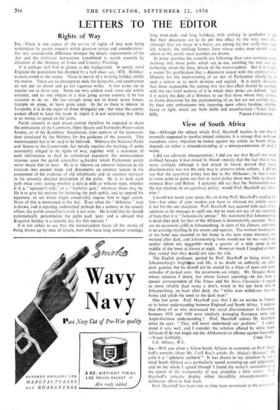View of South Africa
SIR.—Although the subject which Prof. Haarhoff teaches is one that is normally supposed to involve textual criticism, it is strange that, with one exception, every objection he makes against my article on South Africa depends on either a misunderstanding or a misrepresentation of what I wrote.
I did not advocate miscegenation ; I did not say that Brazil was more civilised because it had mixed its blood—merely that the fact that it was more civilised, although it had mixed its blood, proved that racial discrimination was not the only way to preserve white culture. I did not say that the apartheid policy was due to the Afrikaner ; 'in fact I went to some pains to point out that in racial policy there was little to choose between Boer and Briton. I certainly did say that the Nationalists won the last election on an apartheid policy: would Prof. Haarhoff say other- wise ?
I would not waste your space, Sir, on doing Prof. Haarhoff's reading for him—few other of your readers can have so misread my article—were it not for the one exception. Prof. Haarhoff may quarrel with such of my opinions as he manages to spell out, but he must not say of my reporting of facts that it is " fantastically untrue." My statement that Johannesburg is dead after dark for fear of the Africans is demonstrably accurate. There are no pavement cafe"' in Johannesburg, in spite of the climate, and there is no evening strolling In the streets and squares. The woman bookkeeper at my hotel was escorted to her home in the next street whenever she worked after dark, and Johannesburg hosts would not let me—and I am neither infirm nor incpable—walk a quarter of a mile alone in the middle of the town atleleven at night. However much I laughed at them they vowed that they would not take the risk.
The English professor, quoted by Prof. Haarhoff as being struck by Johannesburg's brightikess and life, is no doubt an authority on after- dark gaietiei, but he should not be misled by a blaze of neon and static armadas of parked cars: the pavements are empty. Mr. Douglas Reed, whose opinions I detest, but whose factual reporting—he has been a special correspondent of The Times and the News Chronicle-1 reeard as more reliable thati many a don's, noted in his last book that in Johannesburg. an hour after dusk, the " white man withdraws into his home and yields the town to the dark man." One last point. Prof. Haarhoff says that I -do mo service to Unesco or to better understanding between England and South Africa. I suppose that those of us who denounced the racial discrimination in Germany between 1933 and 1939 were similarly damaging European unity and Anglo-German understanding ? Prof. Haarhoff echoes Dr. Goebbels when he says: "They will never understand our problem." I under- stand it very well, and I consider the solution offered by white South Africans (I do not single out the Afrikaners) an offence against humanity. —Yours faithfully, WC.6, Albany, W.I.






































 Previous page
Previous page